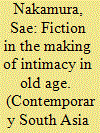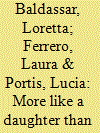| Srl | Item |
| 1 |
ID:
178516


|
|
|
|
|
| Summary/Abstract |
Theoretical debates around the study of ‘kinning’, or emergent intimacies, have usually centred on parent–child relationships, while the later stages of life have largely been ignored. The author suggests that one of the fundamental dilemmas in later-life-kinning lies in the ‘means-ends dichotomy’ and argues that ‘fiction’ may help people to creatively tackle this dichotomy. Ethnographic data were collected from Sri Lanka, where the elderly are prompted to rearrange and/or extend their care relationships, both within and beyond the boundaries of family, against the backdrop of dynamic socio-demographic changes. Evolving in a relatively informal fashion, these activities to rearrange and extend care relationships often involve the direct/indirect mediation of money. Undertaking a detailed case study of an elderly woman, Dorothy, and her caregiver-cum-’kin’ Piyadasa, the author aims to illustrate how fiction enables us to face unfathomable situations or fundamental contradictions – in this case, a means-ends dichotomy. Contrary to the assertion that fiction in the process of kinning can help one define or ‘discover’ a destined, permanent relationship to form a ‘pseudo-biological’ relationship as suggested in previous research on adoption, this paper demonstrates how fiction can help us dwell in uncertainty and gradually reshape our relationships to one another.
|
|
|
|
|
|
|
|
|
|
|
|
|
|
|
|
| 2 |
ID:
184076


|
|
|
|
|
| Summary/Abstract |
This article brings the concept of kinning from anthropology and the sociology of adoption and care work to the study of disaster response and migration. It looks at intimate relationships between the Chernobyl children from Belarus and host families in Italy within the humanitarian programme of child recuperation abroad and argues that these relationships can be understood as kinning. Kinning implies intimate disaster response, a process of fostering transnational relations at a people-to-people level during humanitarian assistance independently of non-state, state, and supranational institutions. The manuscript shows that kinning with host families in childhood resulted in educational migration of the grown-up Chernobyl children to Italy in adulthood. The essay concludes that disaster response and migration studies can benefit from studying the private and the personal in order to understand the mobility trajectories of disaster survivors. This is important when disaster survivors are children and disaster response and migration overlap with coming of age.
|
|
|
|
|
|
|
|
|
|
|
|
|
|
|
|
| 3 |
ID:
155071


|
|
|
|
|
| Summary/Abstract |
This paper explores the intersections of formal and informal care in the relationships that develop between elderly care receivers and their families and migrant domestic care workers and their families. The domestic migrant care literature has tended to focus on two main ‘hidden costs’ of this ‘care-chain’: the ‘care exploitation’ of paid carers by their employers and the ‘care drain’ impact on the family members left behind by the migrant. In this paper, we employ a care circulation framework to examine the process of becoming kin-like – or ‘kinning’, which remains relatively under-explored and warrants further research. An analysis of this process of kinning helps to highlight how the domestic space of care receiver homes are transformed – through the negotiation of relationships with migrant care workers – into transnational social fields that bring the diaspora worlds of the migrants into the everyday worlds of the locals.
|
|
|
|
|
|
|
|
|
|
|
|
|
|
|
|